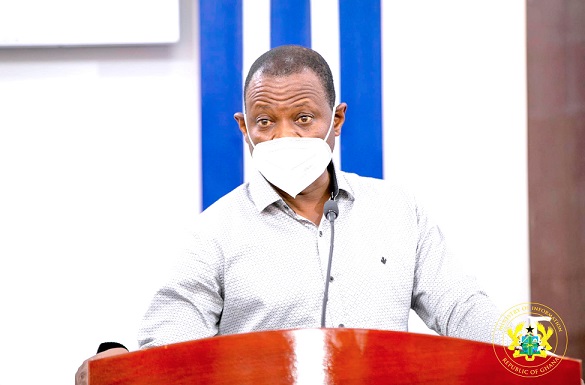The Ghana Health Service (GHS) has directed that all unvaccinated Ghanaians and people with residential status who will be returning to the country after 14 days from midnight yesterday will be vaccinated on arrival.
Additionally, all persons who are 18 or above arriving in the country are required to provide evidence of full vaccination for COVID-19.
The directive forms part of a review of the national COVID-19 preventive protocol instituted at the Kotoka International Airport (KIA) to limit the importation of COVID-19.
The review is included in the raft of new measures the government is rolling out to prevent rising cases during the Christmas and the New Year festivities and avoid a fourth wave.
In an interview with the Daily Graphic to explain a press statement, the Director-General of the GHS, Dr Patrick Kuma-Aboagye, said the review also required that all Ghanaians travelling out of the country be fully vaccinated from the effective date.
“All unvaccinated Ghanaians and residents of Ghana who are currently outside the country and intend to return within 14 days from midnight of 12th December, 2021 are exempted. However, they will be vaccinated on arrival at the airport,” he said.
Fully vaccinated
Dr Kuma-Aboagye defined a fully vaccinated person as one who had taken the full dose of vaccines approved and registered by the Food and Drugs Authority (FDA).
“You need two doses of AstraZeneca, Pfizer, Moderna or Sputnik V to be declared as fully vaccinated; one dose is required of Johnson & Johnson to be declared fully vaccinated,” he said.
The FDA has registered and approved AstraZeneca, Sputnik V, Johnson & Johnson, Pfizer and Moderna vaccines.
Dr Kuma-Aboagye said other arrival requirements remained unchanged and included all arriving passengers possessing 72-hour negative PCR test results on arrival, completion of the Health Declaration Form on arrival and taking a compulsory COVID-19 antigen test.
Premise
He said the review had become necessary because although there had been a decline in the number of COVID-19 cases in the country over the past two months, the global picture of COVID-19 had changed since early last month.
“Globally, many countries are experiencing their fourth wave. A number of travellers from these countries come to Ghana and this is expected to increase during the festive season. This current surge in COVID-19 cases is being reflected at the KIA.
“In November 2020, 168 cases were detected, compared to 241 cases in November 2021, an increase of over 40 per cent. We have since been recording an average of 20 positive cases a day at the KIA. For these positive cases, there is a significant difference in the percentage of COVID-19 infection based on vaccination status recorded at the KIA,” he said.
Dr Kuma-Aboagye said over the last two weeks, cases from the KIA accounted for about 60 per cent of the total number of cases recorded in the country.
Why vaccinate
He said data from the KIA indicated that a COVID-19 positive person was three times more likely to be unvaccinated.
He said the new variant, Omicron, said to be more transmissible, had been detected at the KIA, and that out of the 34 cases detected, 75 per cent were unvaccinated.
Dr Kuma-Aboagye said the current increase in cases, together with the detection of the Omicron variant among international arrivals and the expected increase during the festive season, called for urgent actions to prevent a major surge in COVID-19 cases in the country.
“To avert this, these directives are to be implemented, effective midnight 12th December, 2021. The global outlook is enough ground for the country to be on high alert,” he said.
Source: Graphic Online





